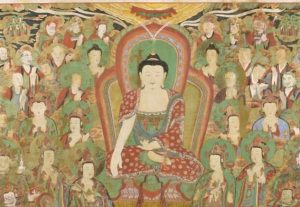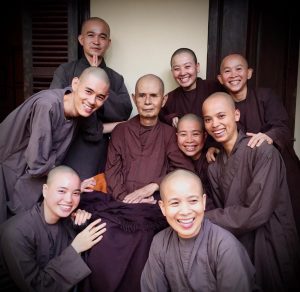
The Korean Seon (Zen) master Venerable Pomnyun Sunim (법륜스님) wears many hats: Buddhist monk, teacher, author, environmentalist, and social activist, to name a few. As a widely respected Dharma teacher and a tireless socially engaged activist in his native South Korea, Ven. Pomnyun Sunim has founded numerous Dharma-based organizations, initiatives, and projects that are active across the world. Among them, Jungto Society, a volunteer-based community founded on the Buddhist teachings and expressing equality, simple living, and sustainability, is dedicated to addressing modern social issues that lead to suffering, including environmental degradation, poverty, and conflict.
This column, shared by Jungto Society, presents a series of highlights from Ven. Pomnyun Sunim’s writings, teachings, public talks, and regular live-streamed Dharma Q+A sessions, which are accessible across the globe.
The following teachings were given in Dallas on 14 September 2023. This article is the 14th in a special series taken from Ven. Pomnyun Sunim’s Dharma tour of Europe and North America—his first overseas tour since the pandemic. Titled “Casual Conversation with Ven. Pomnyun Sunim: Come Talk about Life, Wisdom, and Happiness” the Dharma tour ran from 1–22 September 2023, taking in 21 cities: six in Europe and 15 in North America.*

Giving up my hobby for my family
Q: I am someone who really loves playing tennis. I’ve been playing since my college days and was active in club activities. Fourteen years ago, I met my beloved wife. I love tennis so much that I play for three hours at least three times a week. But since last year, my wife has been telling me to play only once a week. I have a son in middle school, and her reason is that my son’s education would go well if his father stayed at home.
My favorite hobby is tennis, but when my wife tells me not to play, my heart feels heavy and painful. Nevertheless, out of respect for my wife’s opinion, I have been playing tennis only once a week. As a compromise, she has suggested that I play during the day. However, it’s difficult to play tennis in Dallas during the day because it’s so hot.
I have to go to the tennis court at night so that I can meet people and play. In the early days of our marriage, my wife agreed that I could play tennis whenever I wanted, but I didn’t receive a written pledge at the time, which is why I’m in trouble now. I’ve earned a lot of money for my family, so I feel frustrated because I’m facing this challenge. I love my wife, but how can I overcome these feelings?
Ven. Pomnyun Sunim: Do you have money?
Q: Yes, I have enough to live on.
Ven. Pomnyun Sunim: Then you could spend money to build an air-conditioned tennis court in a quiet space and play tennis there during the day.
Q: You want me to play tennis alone?
Ven. Pomnyun Sunim: You could create an air-conditioned tennis court and invite your friends to play there. If you provide a tennis court for free, there’s no reason people wouldn’t come. Or you could finance the tennis court you play at to install air conditioning. If you have the money, you can do that. If you don’t have the money, it’s impossible. Meeting both your desire to play tennis and your wife’s needs is bound to cost you money.
Q: It seems like it would cost too much money. Land prices in Dallas are quite high.
Ven. Pomnyun Sunim: Dallas has a lot of land, so if you find a place on the outskirts it won’t cost a lot of money.
Q: There would be the problem of having to travel out of town for an hour.
Ven. Pomnyun Sunim: You can go out of town for about an hour during the day. And you can make friends in that area and play tennis with them. Don’t try to take your current friend to the suburbs.
The second way is to change your thinking. If you were to get into a car accident while driving there and injure your leg, you wouldn’t be able to play tennis even if you wanted to. . . . I guess you’d have to live in a wheelchair. When you think about it in this way, you’ll feel grateful that you’re to play tennis with your good legs at least once a week. If you run out of money, you’ll have to change your thinking like this.
Q: When I think about how I’m living under pressure from my wife, I feel like, “Why should I listen to that?”
Ven. Pomnyun Sunim: If you keep thinking that way, one day you might get into a car accident and hurt both your legs, and only then will you think, “This is what Sunim told me.” Even now, if you let go of your thoughts and feel grateful for having a healthy body, you can live a satisfied life by playing tennis about once a week. If you’re really dying to play tennis, you can play during the day even if it’s a bit hot. However, there’s also some risk in doing this: if you make all these sacrifices and your child gets bad grades or doesn’t listen to his parents, you’ll feel angry with your wife and child:
“I don’t even play tennis, which I love so much, and I make time for you, wife and for you, son, so why is this all you do?”
When someone thinks they’ve made sacrifices, they place demands on the other person. There’s a possibility that such demands may emerge as complaints in the future. But this is about your opinion; your wife and child don’t think that way.
A person who lives away from her husband and travels abroad with her child for his education is sometimes called a “wild goose mother.” However, most children who study abroad like this do not succeed in their studies. The mother who travels abroad for her child’s studies has no husband nor friends with her, so she has no choice but to be obsessed with her child. She always has this mindset toward the child: “I do this for you, living away from your father, but why don’t you study and do something more?” So she feels she has no choice but to nag her child. But from her child’s perspective, he cannot understand his mother’s feelings. If he knows how to understand her, can he be said to be a child and not an adult? So the conflict between the mother and the child becomes more and more severe, and eventually the child begins to think these thoughts in his mind towards his mother:
“Mom brought me here because she wanted to, and now she’s using me as an excuse to put the blame on me.”
When he feels angry like this, there comes a point where he has to say out loud what he’s thinking. That completely upsets his mother, and so her relationship with her child is not smooth. Why does this occur? Because she thinks she is sacrificing.
In the old days, wives often thought, “I make sacrifices for my husband, but he doesn’t understand how I feel.” Most wives who do not go to work want their husbands to take them out on weekends because they stay home with the children all week. However, most working husbands would think, “I’ve been stressed out at work all week, so I want to rest on the weekends, but my wife nags me.” But his wife thinks, “Shouldn’t he at least make time on the weekend for me, who is stuck at home all week?” Their perspectives were completely different.
Even after retirement, this pattern of marital conflict would often remain similar. The husband might think, “I worked for 40 years, so now I deserve to relax,” while wives may say, “When you were earning money, I took care of the housework and cooking, but now that you’re retired, why do I still have to do all these chores?” Therefore, conflicts become more severe after retirement because their perspectives are different.
Because you are also at risk of doing the same, I suggested that you think of a car accident. If you keep thinking, “I have persevered and devoted myself to my child and wife,” this conflict is bound to become worse in the future.
Of course, the third way is simply to play tennis as much as you want. If your wife criticizes you, say: “I feel like I’m going to die if I don’t do this,” and just keep playing tennis. You can live your life doing everything you want to do. If your wife wants to pack her bags and leave, this is a way to say goodbye to her:
“If you accept me like this, we can live together, but if you can’t accept me like this, I can’t live with you either. We talked about this even before we were married. I can’t compromise on this issue.”
After talking to your wife like this, you establish your boundaries and live accordingly.
Q: My wife acknowledges that we had an agreement before, but she says that we can change it since we didn’t write a pledge. She says that our child’s education is more important now.
Ven. Pomnyun Sunim: If a pledge had been written, the conflict would now be even more severe. If you had a written agreement, you would feel even more justified. There’s a saying that goes: “Your state of mind when going to poop is different from your state of mind after pooping.” Before marriage, a promise was made with the intent of marrying. However, once marriage has taken place, is there really a need to stick to that promise?
The human mind is always changing like this. It’s the way of the human heart that things go this way at one time and then that way at another time. The idea that a person’s heart must always remain the same is wrong. Statements such as “that person betrayed me” or “this person did not keep her promise” are all wrong. Unless you’re a fraudster, you don’t make a promise at the beginning with the intention of breaking it later. Most people aren’t fraudsters; that was truly how she felt back then, and this is how she feels now.
Think about this from your wife’s perspective. When you two didn’t have children, your wife embraced your hobby. But now she thinks that your child is older, and father and child need to spend more time together. Why does she feel this way? Now the child is not listening to her. That’s why she wants her husband’s help. So you need to ask your wife what she wants your child to do and negotiate quietly with your child:
“If you do what mom wants, dad will give you some allowance and we’ll spend weekends together.”
If you negotiate with your child like this, you can solve the problem wisely. Claiming that you are justified because your wife promised something before marriage, or complaining that you can’t pursue your hobby because of your beloved wife—these are not the actions of someone waking up to reality. Things were one way in the past, but now the circumstances have changed. You need to focus on solving this problem wisely.
You can’t do everything you want and you can’t give in to everything the other person asks. You need to talk with your wife about how best to find a balance between those two perspectives and reach a compromise. You also have to negotiate with your child. A wise person is one who lets go of himself and seeks a path in the here and now.
Q; Thank you.
Life without suffering
Ven. Pomnyun Sunim: If life is suffering, shouldn’t we study why we are suffering? There is no set answer for how to live life; everyone can live as they please. But the question is why are you still suffering when you have lived your life the way you want?
You all emigrated here because you wanted to, and at first you were incredibly happy. But after a while, you began to complain that it’s painful. You say that you’re suffering because of your work life while working at the company that you wanted to work for. You say that you’re suffering because of the store that you opened because you wanted to. You say that you’re suffering because of your married life—living with someone you married because you wanted to.
All of these situations are contradictory.
If you marry because you like each other, why do you complain that marriage is painful? Isn’t this a situation that really needs to be studied? “Of all the men and women, I married the one I liked the most, so why do I feel hateful and resentful?” You hate your husband or wife, but you don’t think about studying him or her. So I suggest that you research why suffering occurs.
The Buddha’s teachings were not originally religious; they were teachings about the question, “Why is there suffering?” The Buddha is a person who studied how to live without suffering. How you can become rich or where you go when you die were not the Buddha’s concerns. Regardless of whether you are rich or poor, whether your status is high or low, all these things aside, the most important question is: “How can I live a life without suffering?” In other words, not suffering can be called a “happy life.” The happy life we talk about here is different in character from the pleasurable life because we mistake pleasure for happiness, and suffering inevitably follows.
A healthy life is one without pain. Being healthy doesn’t mean that you have to run faster than others in the 100-meter dash or lift heavy weights that others can’t lift. Tall people are as tall as they are, short people as small as they are, children are as children, adults are as adults, disabled people are as they are, and if these people are not sick, they are healthy. Similarly, if you are not suffering, you are happy. But because you mistake pleasure for happiness, suffering always follows.
With a slight shift in perspective—regardless of our religion, race, nationality, or gender—anyone can live without suffering. You can live without suffering, alone or with others, whether you’re young or old. Even when your body experiences physical pain, you can still live without suffering.
If a person who lived a miserable life in Korea emigrates to the United States, will their suffering go away? If a person who was suffering when living alone marries, will their suffering go away? Suffering does not occur independently; our suffering occurs as we live because we have karma. When we destroy karma, we can escape suffering and live a pain-free life. From that perspective, I hope you can take the time to explore yourself a little more deeply. But you shouldn’t think too much because all of our suffering comes from our thoughts.
Anyone born into this world can live happily.
I hope you don’t lose sight of this perspective and live your life lightly. This is how one loves oneself: stop looking at others and start loving yourself. I think you guys are torturing yourselves too much!
See more
Pomnyun
Jungto Society
JTS Korea
JTS America
International Network of Engaged Buddhists
Related features from BDG
Live Life Lightly
Prostrating as a Part of Buddhist Practice
Suffering and the Significance of Insignificance
Treasure the Present and Value Your Own Life
Free Will and Freedom from Suffering
Do Not Sacrifice Later for Now
Begin Life Now
Becoming the Master of Your Own Life
You Are Alive Today
Everyone Has the Right to be Happy
Personal Action to Mitigate the Climate Crisis
Awareness, the Beginning of Change
How to Live Life More Freely
Related videos from BDG
Dharma Q+A with Ven. Pomnyun Sunim
Wisdom Notes from Ven. Pomnyun Sunim




















